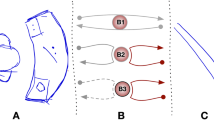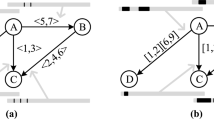Abstract
The scientific and technological problems of constructing dynamic integrated expert systems and the approaches to their solutions are discussed. A new stage of the development of a problem-oriented methodology for constructing integrated expert systems in solving dynamic integrated expert systems is considered. The technical issues concerned with the presentation and processing of temporal knowledge are of special interest. The features of the implementation of temporal inference software for the dynamic version of the AT-TECHNOLOGY tool complex are described.
Similar content being viewed by others
References
Osipov, G.S., Metody iskusstvennogo intellekta (Artificial Intelligence Methods), Moscow: FIZMATLIT, 2011.
Rybina, G.V., Teoriya i tekhnologiya postroeniya integrirovannykh ekspertnykh system (Theory and Technology of Constructing the Integrated Expert Systems), Moscow: Nauchtekhlitizdat, 2008.
Rybina, G.V. and Parondzhanov, S.S., Tekhnologiya postroeniya dinamicheskikh intellektual’nykh sistem. Uchebnoe posobie (Technology of Constructing the Dynamic Intellectual Systems. Study Guide), Moscow: NIYAU MIFI, 2011.
Popov, E.V., Fominykh, I.B., Kisel’, E.B., and Shapot, M.D., Staticheskie i dinamicheskie ekspertnye sistemy. Uchebnoe posobie (Statistical and Dynamic Expert Systems. Study Guide), Moscow: Finansy i statistika, 1996.
Vasil’ev, S.N., From classical control problems to the intellectual-controlling, Izv. RAN. TiSU, 2001, no. 1, pp. 5–22.
Makarov, I.M., Lokhin, V.M., Man’ko, S.V., and Romanov, M.P., Iskusstvennyi intellekt i intellektual’nye sistemy upravleniya. Otdelenie informatsionnykh tekhnologii i vychislitel’nykh sistem RAN (Artificial Intellect and Intellectual Control Systems. Information Technology and Calculation Systems Departure of Russian Academy of Sciences), Moscow: Nauka, 2006.
Bashlykov, A.A. and Eremeev, A.P., Semiotic real-time systems for the intellectualsupport of making a solution at controlling the complex technical objects, Inf.-Izmer. I Upr. Systof reSemioticheskie sistemy real’nogo vremeni dlya intellektual’noi podderzhki prinyatiya reshenii pri upravlenii slozhnymi tekhnicheskimi ob“ektami, Inf.-Meas. Cont. Sys., 2013, no. 5, pp. 49–57.
Tarasov, V.B., Ot mnogoagentnykh sistem k intellektual’nym organizatsiyam: filosofiya, psikhologiya, informatika (From multiagent systems to intellectual organizations: philosophy, psychology, informatics), Moscow: Editorial URSS, 2012.
Rybina, G.V., Expert systems and development some results, Inf.-Meas. Cont. Sys., 2013, no. 5, pp. 35–48.
Rybina, G.V., Mozgachev, A.V., and Parondzhanov, S.S., So Tikha Aung, Dynamic integrated expert systems: presentation and processing of the temporal knowledge, Dev. Syst. Control and Diagnostics, 2013, no. 6, pp. 23–33.
Rybina, G.V., Tools of constructing the dynamic integrated expert systems: the AT-TECHNOLOGY complex development, Artif. Intell., 2010, no. 1, pp. 41–48.
Rybina, G.V., Parondzhanov, S.S., Shantser, D.I., and Mozgachev, A.V., Trends of developingand applying the current software to support the dynamic intellectual systems, Dev. Syst. Control and Diagnostics, 2010, no. 11, pp. 2–11.
Rybina, G.V., Demidov, D.V., Shantser, D.I., and Mozgachev, A.V., Dynamic integrated expert systems: new opportunities of the AT-TECHNOLOGY tool complex, Inf. Meas. Cont. Sys., 2011, no. 6, pp. 7–15.
Rybina, G.V., Practical application of the problem-oriented methodology of constructing the integrated expert systems (overview of applications and statistic-dynamic subject domains), Dev. Syst. Control and Diagnostics, 2011, no. 12, pp. 10–28.
Shoham, Y., Temporal logics in ai: semantical and ontological considerations, Artif. Intell., 1987, no. 33(1), pp. 37–63.
Shoham, Y. and Goyal, N., Representing time and action in ai. revised version of: problems in formal temporal reasoning, Artif. Intell., 1988, no. 36(1), pp. 49–61.
Eremeev, A.P. and Troitskii, V.V., Concepts and models of time presentation and their application in the intellectual systems, Artif. Intell. News, 2004, no. 1, pp. 6–29.
Spranger, S., Representation of temporal knowledge for web-based applications, Munchen, 2002.
Allen. J., Time and time again: the many ways to represent time, J. Intell. Inf. Sys., 1991, vol 6, no. 4, pp. 341–356.
Stefanyuk, V.L., Dinamicheskaya ekspertnaya sistema i logicheskaya problema freima. Mezhdunarodnaya konferentsiya po iskusstvennomu intellektu (AIS’07, in CAD-2007) (Dynamic expert system and logic frame problem, Int. Conf. on Artificial Intellect (AIS’07, in CAD-2007)), Moscow: Fizmatlit, 2007, vol. 2, pp. 107–113.
Fedunov, B.E., Bortovye operativno sovetuyushchie ekspertnye sistemy-novyi klass algoritmov upravleniya antropotsentricheskimi ob”ektami, Odinnadtsataya natsional’naya konferentsiya po iskusstvennomu intellektu s mezhdunarodnym uchastiem. KII-2008: Trudy konferentsii v 3-kh tomakh. Tom 1 (Board Rapid-in-Advice Expert systems/New class of Algorithms of Controlling the Human-Centered objects, Proc. XI Int. Conf. on Artificial Intelligence with Int. Membership KII-2008 in Three Volumes. Vol. 1), Moscow: LENAND, 2008.
Osipov, G.S., Dynamic intellectual systems, Artif. Intell., 2008, no. 1, pp. 47–54.
Eremeev, A.P., Logika vetvyashchegosya vremeni i ee primenenie v intellektual’nykh sistemakh podderzhki prinyatiya reshenii, Desyataya natsional’naya konferentsiya po iskusstvennomu intellektu s mezhdunarodnym uchastiem KII-2006: Trudy konferentsii v 3-kh tomakh (Logics of Branching Time and its Application in the Intellectual Solution Support Systems, Proc. X Int. Conf. on Artificial Intelligence with Int. Membership KII-2008 in Three Volumes), Moscow: Fizmatlit, 2006, vol. 3, pp. 746–754.
Eremeev, A.P. and Kurilenko, I.E., A component of temporal reasoning for intellectual real-time solution support systems, Artif. Intell., 2009, no. 1, pp. 31–45.
Eremeev, A.P. and Korolev, Yu.I., Petri networks as the tool to develop the intellectual real-time solution support systems. Hybrid and synergetic intellectual systems: theory and practice. Materialy 1-go mezhdunarodnogo simpoziuma (Proc. I Int. Symposium), Kaliningrad: Izd. BFU im. I. Kanta, 2012.
Allen, J., Maintaining knowledge about temporal intervals, Commun. ACM, 1983, vol. 26 no. 11, pp. 832–843.
Plesnevich, G.S., Method of Analytical Tables for the Event Logics, Trudy Mezhdunarodnoi konferentsii “Intellektual’noe upravlenie: novye intellektual’nye tekhnologii v zadachakh upravleniya (ICIT’99)” (Proc. Int. Conf. “Intellectual Control: New Intellectual Technologies and Control Problems”), Pereslavl’-Zalesskii: IPS, 1999.
Ladkin, P., Anger, F., and Rodriguez, R., Temporal reasoning with intervals in branching time. TR-90-028, Int. Comput. Sci., Inst., 1990.
Rybina, G.V. and Demidov, D.V., Models, methods, and software of the inference in the integrated expert systems, Eng. Phys., 2007, no. 2, pp. 51–60.
Moore, B., Questions and Answers about G2, Copyright, Gensym Corporation, 1993, pp. 26–28.
Rybina, G.V., Shantser, D.I., and Lipatov, A.A., Imitation modeling of external world at constructing the dynamic integrated expert systems, XIII Natsional’naya konferentsiya po iskusstvennomu intellektu s mezhdunarodnym uchastiem (Proc. XIII Int. Conf. on Artificial Intelligence with Int. Membershiphip in Three Volumes), Belgorod: Izd. BGTU, 2012.
Author information
Authors and Affiliations
Corresponding author
Additional information
Original Russian Text © G.V. Rybina, A.V. Mozgachev, 2014, published in Iskusstvennyi Intellekt i Prinyatie Reshenii, 2014, No. 1, pp. 34–45.
About this article
Cite this article
Rybina, G.V., Mozgachev, A.V. The use of temporal inferences in dynamic integrated expert systems. Sci. Tech.Inf. Proc. 41, 390–399 (2014). https://doi.org/10.3103/S0147688214060069
Published:
Issue Date:
DOI: https://doi.org/10.3103/S0147688214060069




